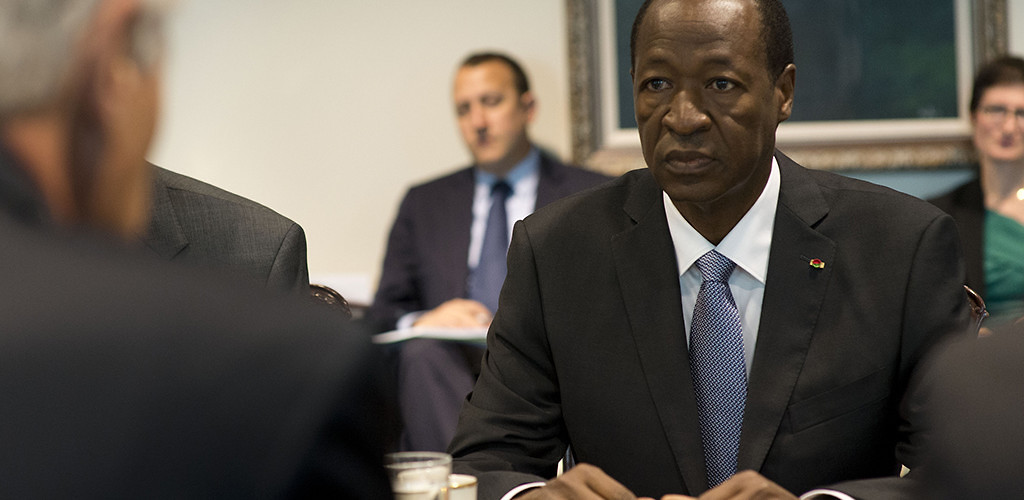Burkina Faso's former president Blaise Compaoré (C) is pictured during a meeting at the Pentagon on September 23, 2013. (Erin A. Kirk-Cuomo/Flickr)
In order to contest Burkina Faso’s October 2015 election, long-serving leader Blaise Compaoré, sought to remove Article 37 of the country’s constitution which governs presidential term limits. Compaoré’s efforts to extend his rule to an unconstitutional third term were met with fierce resistance, culminating in the overthrow of his regime in late October 2014.
For much of 2014, opposition parties and civil society groups had held nationwide civil disobedience campaigns against Compaoré’s intentions. These demonstrations gained popular momentum after Burkinabe parliamentarians gathered on October 30 to vote on a government-proposed bill which would allow for a referendum on Article 37. On October 31, following intensified unrest in the capital, Ouagadougou, the military assumed executive power and confirmed Compaoré’s resignation. Executive power was subsequently transferred to the speaker of the National Assembly ahead of the establishment of a transitional government.
Yet, on the continent Compaoré was not alone in his aspirations of extended rule. Of the 17 African states set to vote in 2015 and 2016, 15 presidents will likely seek another term. While six long-term incumbents are eligible to contest the election without set presidential term limits in their respective countries’ constitutions, Pierre Nkurunziza (Burundi), Yayi Boni (Benin), Joseph Kabila (Democratic Republic of Congo), and Denis Sassou Nguesso (Republic of Congo), as with Compaoré, will need to amend their countries’ constitution to do so. Yet the developments in Burkina Faso in late 2014 should serve as a warning to these African leaders. In their attempts to prolong their tenures, these incumbents may be risking both their country’s stability and their very own political longevity.
The reality is that for many African long-term leaders, the zero-sum political game offers little incentive to step down, and many face negative consequences if they do. Take Omar al-Bashir, who, currently serving his final term as president of Sudan, is set to face ICC charges for genocide, crimes against humanity, and war crimes in Darfur when he returns to civilian life. Despite claiming he would not contest the country’s April 2015 presidential elections, the ruling National Congress Party (NCP) has elected al-Bashir as its presidential candidate. Although the 2005 constitution stipulates that a Sudanese head of state may only serve two successive terms, al-Bashir has only contested one election since the formal implementation of the 2005 constitution, and the NCP asserts the condition is not retroactive.
Nevertheless, public discontent over al-Bashir’s regime, as evidenced by the September 2013 student uprising, is growing. With the three main opposition parties likely to boycott the ballot, political avenues for leadership change will produce slow results. The continued state crackdown on opposition leaders does not bode well for political openness. Rather, an agreement unifying the National Umma Party (NUP), backed by the opposition coalition, the National Consensus Forces (NCF), and the umbrella rebel grouping Sudan Revolutionary Front (SRF), dubbed the Paris Declaration, has created a political opposition with rebel backing and may facilitate an increase in conflict ahead of the election. Furthermore, al-Bashir’s continued preference for paramilitary groups, such as the Rapid Support Forces (RSF), is likely to aggravate already present grievances in the national army, weakening the country’s campaign in the insurgent-embattled Darfur, Kordofan, and Blue Nile regions.
A similar scene is developing in Central Africa, where Burundian President Pierre Nkurunziza is also seeking an unconstitutional third term. Burundi is slowly recovering from a devastating 13-year-long civil war which pitted Hutu rebel groups against the Tutsi-dominated government security forces. These tensions have been held in equilibrium by a constitutional qualification which stipulates an ethnic-based power distribution. This condition is currently upheld by a coalition government comprising of Nkurunziza’s Hutu-dominated National Council for the Defense of Democracy—Forces for the Defense of Democracy (CNDD-FDD) and the Tutsi-dominated Union for National Progress (UPRONA).
However, Nkurunziza’s efforts to extend his rule have resulted in resignations from the coalition government, both forced and in protest, disrupting the fragile power equilibrium. This equilibrium is likely to become even more tenuous should Nkurunziza be successful in removing legislation on ethnic allocations within the civil service. Yet, this power struggle should not be trivialized to ethnic allegiance alone but rather reveals efforts by Nkunrunziza to exclude his political rivals amid his own dwindling popularity. And Burundi’s history may allow the politically-snubbed to seek a rebel campaign against Nkurunziza where ethnic alliances can serve as a rallying tool.
What is increasingly apparent is that long-term leaders and their complacency in power are becoming less tolerated, both by their political counterparts and the wider population. Africa’s big men wanting to stay in power will need to ensure they have the popular backing to validate their ambitions, or a loyal force to keep sources of opposition in check. Yet playing with the pillars of democracy, including presidential term limits, does not demonstrate the prowess necessary to secure a long-term presidency. Events in Burkina Faso have indeed ushered in new relevance for the power of the protester and may raise second thoughts for those seeking an unconstitutional third term.





